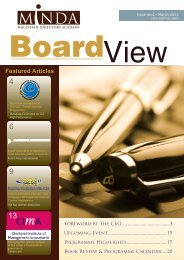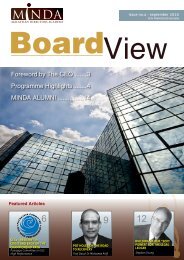HIGHLIGHTS - MINDA Malaysian Directors Academy
HIGHLIGHTS - MINDA Malaysian Directors Academy
HIGHLIGHTS - MINDA Malaysian Directors Academy
You also want an ePaper? Increase the reach of your titles
YUMPU automatically turns print PDFs into web optimized ePapers that Google loves.
FEATURED ARTICLES _ARTICLE ONEMALAYSIAN DIRECTORS ACADEMYnominee director as being one which not only did not actin the interests of the company in which he was appointed,but that he completely subordinated that interest to thatof his appointer [Industrial Concrete Products Bhd vConcrete Engineering (2001). The criticised director washeld to account for hiving off the assets of the Company towhich he was appointed without considering the interestof the company. In such a situation the other members ofboard have to exercise utmost vigilance and make carefulevaluations of proposals placed before the Board.If independent advice is needful seek it out. If minutes donot reflect accurately your dissenting views insist upon it inwriting. Failure to do so can cause unnecessary exposureto even criminal sanctions and penalties.Treading SoftlyNominee directors have to tread carefully, and withprudence and discernment. Information that is pricesensitivein subsidiaries cannot be passed on to theirappointers if there is knowledge and intention that it maybe used for trading of the securities. This could fall foul ofthe insider-trading prescriptions of the Capital Markets &Services Act 2007.Any corporate information which may be construable tobe price – sensitive has to be handled with discretion. Anominee director risks exposure to liabilities if at any onetime the information is characterised to be a tip for tippeeand/ or procurement to invest or divest securities. So anominee director has to be prudent and ensures that anyinformation supplied during closed period of dealings isnot utilised by recipient for investment decisions.A GLC director once shared in a workshop that shehandled the dilemma of being accountable to herappointer, Khazanah in a transaction which she as adirector of the company upon which she is appointedmay have an honest opinion that it is in best interest ofthe company. However she made it clear that the decisionof Khazanah as shareholders is reserved and will beexercised independently at the EGM convened. This is adefensible position in law as the vote of a shareholder isa recognized property right and is distinct from that of thenominee director who holds agent s’ duties in multipleand overlapping ways .Related Party Transactions (“RPTs”)This is a complex area filled with land mines for the unwary.Firstly there are core provisions of the Companies Actwhich prohibits and or delineates transactions betweena substantial shareholder and by a director section 133A prohibits loans to person connected with directors.Substantial property transactions cannot be carriedout if the value of the undertaking or property exceeds25 % of total assets of the company ; or the net profitsattributed to the transaction amounts to more than 25 %of the net profit if the company or the value exceeds 25 %of total issued share capital of the company, whicheveris highest . If the company is a listed company then theprescribed value is now aligned to that of the Bursa Listingrequirements.Again it lies on directors to be extra vigilant whenevertransactions are proposed that carries a whiff of RPTs.Listed companies directors must ensure compliance withchapter 10 of the Listing Requirements.How Many Hats Can You Wear?Bob Tricker( 2009) cited Lord Caldecote (Chair of DeltaMetal) advice to Executive <strong>Directors</strong> in words which alldirectors may give heed to Executive directors have twohats –the hat of the executive and the hat of the director.When you come into my board room I want you to bewearing your director’s hat. Each director you come intomy boardroom I want you to be wearing your director’s hat.Each director is equally responsible with me for directingthe company. You are not there to represent your functionor your divisional company. Nor are you there to defendyour executive performance or bid for resources for yourexecutive activities, you are there to help me govern thecompany overall.”Wise words. <strong>Directors</strong> must give heed those words. Thepossibility of missing one’s head and wearing wrong hatwill be obviated.[The original version of the above article was published in The STARnewspaper Saturday, 23rd July 2011 issue]Philip Koh is an Adviser to the <strong>Malaysian</strong> Institute for CorporateGovernance (MICG). Currently he is a member of the Corporate LawReform Steering Committee and <strong>Malaysian</strong> Institute of AccountantsEthics Committee. Philip co-authored publications such as “The Law ofContract in Malaysia and Singapore – Cases and Commentary” (Oxford)(1979), Chan & Koh’s Company Law (Sweet & Maxwell) and Sheridan &Groves, The Constitution of Malaysia (LexisNexis). He is a member of theEditorial Advisory Board of the Bankers Journal Malaysia; a publicationof the Institute of Banker’s Malaysia and was co-project writer andconsultant on Corporate Governance and Corporate Insolvencies for theWorld Bank, OECD, ADB and ADBI.6







